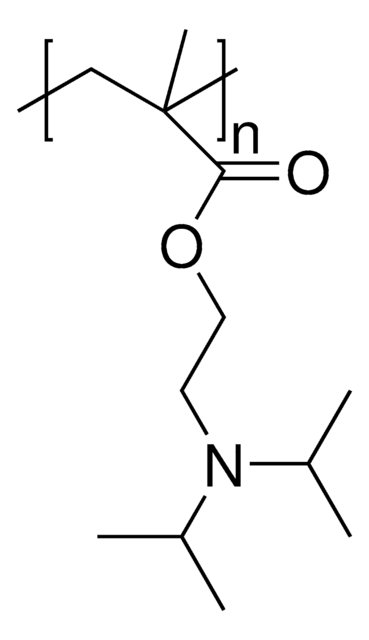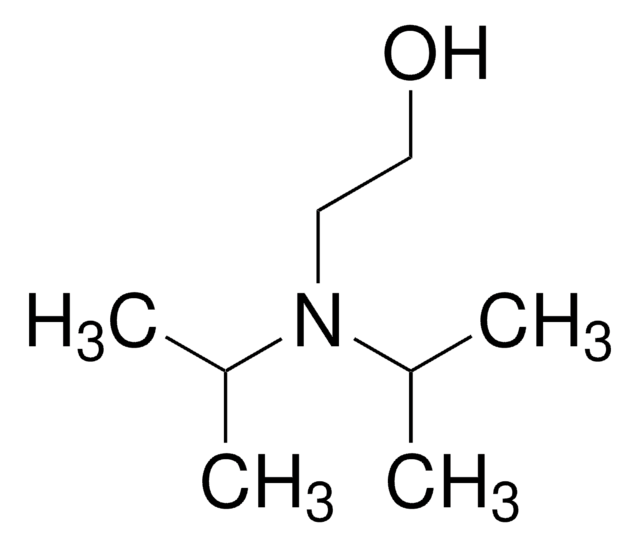730971
2-(Diisopropylamino)ethyl methacrylate
97%, contains ~100 ppm monomethyl ether hydroquinone as inhibitor
Sinonimo/i:
DPA, DPAEMA
Autenticatiper visualizzare i prezzi riservati alla tua organizzazione & contrattuali
About This Item
Formula empirica (notazione di Hill):
C12H23NO2
Numero CAS:
Peso molecolare:
213.32
Numero CE:
Numero MDL:
Codice UNSPSC:
12162002
ID PubChem:
NACRES:
NA.23
Prodotti consigliati
Livello qualitativo
Saggio
97%
Stato
liquid
contiene
~100 ppm monomethyl ether hydroquinone as inhibitor
Indice di rifrazione
n20/D 1.145
Densità
0.900 g/mL at 25 °C
Temperatura di conservazione
2-8°C
Stringa SMILE
CC(C)N(CCOC(=O)C(C)=C)C(C)C
InChI
1S/C12H23NO2/c1-9(2)12(14)15-8-7-13(10(3)4)11(5)6/h10-11H,1,7-8H2,2-6H3
SVYHMICYJHWXIN-UHFFFAOYSA-N
Categorie correlate
Descrizione generale
2-(Diisopropylamino)ethyl methacrylate (DPA) is a methacrylate class of monomer used to prepare various DPA-derived polymers, which includes poly(2-(diisopropylamino)ethyl methacrylate) (PDPA). PDPA is a water-soluble polymer, which exhibits sensitivity to changes in pH and temperature. At pH levels below its pKa value of approximately 6.5, PDPA undergoes a transition from hydrophobic to hydrophilic behavior. This transition is attributed to the protonation of its amino groups. These unique properties of PDPA polymers consequently make them very useful in various applications such as drug delivery, gene delivery, sensors, surfaces, membranes, and chromatography.
Applicazioni
2-(Diisopropylamino)ethyl methacrylate can be used:
- As a monomer in the synthesis of multi-responsive hyperbranched copolymers by combining poly(oligo(ethylene glycol)methyl methacrylate) (P(OEGMA)) and 2-(diisopropylamino)ethyl methacrylate (PDIPAEMA) using RAFT polymerization. These polymers find application in drug delivery, gene delivery and tissue engineering.
- A monomers in the synthesis of block copolymer poly(ethyleneglycol)-b-poly(2-(diisopropylamino)ethyl methacrylate) (PEG-b-PDPAEMA). These pH-responsive micelles can be used for enhanced intracellular drug delivery. The DPA monomer contributes to the pH-responsive nature of the copolymers.
Avvertenze
Danger
Indicazioni di pericolo
Consigli di prudenza
Classi di pericolo
Eye Dam. 1 - Skin Irrit. 2 - Skin Sens. 1 - STOT SE 3
Organi bersaglio
Respiratory system
Codice della classe di stoccaggio
10 - Combustible liquids
Classe di pericolosità dell'acqua (WGK)
WGK 3
Punto d’infiammabilità (°F)
210.0 °F
Punto d’infiammabilità (°C)
98.9 °C
Scegli una delle versioni più recenti:
Possiedi già questo prodotto?
I documenti relativi ai prodotti acquistati recentemente sono disponibili nell’Archivio dei documenti.
I clienti hanno visto anche
Kaishi Narushima et al.
Nanoscale, 9(30), 10653-10661 (2017-06-14)
Up-conversion materials composed of donor and acceptor molecules which convert low energy photons into higher energy ones by triplet-triplet annihilation can improve the sensitivity of photocatalysts or the efficiency of solar cells. The use of crystalline materials can lead to
Robert K McNamara et al.
Prostaglandins, leukotrienes, and essential fatty acids, 136, 23-34 (2017-05-23)
There is a substantial body of evidence from animal studies implicating polyunsaturated fatty acids (PUFA) in neuroinflammatory, neurotrophic, and neuroprotective processes in brain. However, direct evidence for a role of PUFA in human brain structure and function has been lacking.
Emma von Wowern et al.
The journal of maternal-fetal & neonatal medicine : the official journal of the European Association of Perinatal Medicine, the Federation of Asia and Oceania Perinatal Societies, the International Society of Perinatal Obstetricians, 30(19), 2309-2314 (2016-10-14)
Uterine artery (UtA) Doppler velocimetry changes and increased arterial stiffness are associated with preeclampsia. We aimed to investigate the relation between UtA velocimetry changes and arterial stiffness in pregnant women. Doppler velocimetry and photoplethysmographic digital pulse wave analysis (DPA) were
Katina Handeland et al.
Nutrition journal, 16(1), 64-64 (2017-10-04)
Fatty fish is the dominant dietary source of n-3 LCPUFAs but it also contains other micronutrients considered important for brain development and function. To our knowledge, the effect of fatty fish intake on cognitive function in adolescents has not been
Francesco Camerlengo et al.
BMC plant biology, 17(1), 248-248 (2017-12-21)
Among wheat gluten proteins, the α-type gliadins are the major responsible for celiac disease, an autoimmune disorder that affects about 1% of the world population. In fact, these proteins contain several toxic and immunogenic epitopes that trigger the onset of
Il team dei nostri ricercatori vanta grande esperienza in tutte le aree della ricerca quali Life Science, scienza dei materiali, sintesi chimica, cromatografia, discipline analitiche, ecc..
Contatta l'Assistenza Tecnica.


![N-[3-(Dimethylamino)propyl]methacrylamide 99%, contains MEHQ as inhibitor](/deepweb/assets/sigmaaldrich/product/structures/295/145/6b4aae15-7cb5-4b7b-9c06-8e6d24e50951/640/6b4aae15-7cb5-4b7b-9c06-8e6d24e50951.png)




![[2-(Methacryloyloxy)ethyl]trimethylammonium chloride solution 75 wt. % in H2O](/deepweb/assets/sigmaaldrich/product/structures/316/612/66b0f4cf-d060-427d-b4f5-e8fab3e5cffe/640/66b0f4cf-d060-427d-b4f5-e8fab3e5cffe.png)







